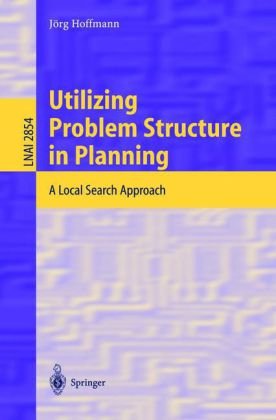Jörg Hoffmann (auth.)3540202595
Planning is a crucial skill for any autonomous agent, be it a physically embedded agent, such as a robot, or a purely simulated software agent. For this reason, planning, as a central research area of artificial intelligence from its beginnings, has gained even more attention and importance recently.
After giving a general introduction to AI planning, the book describes and carefully evaluates the algorithmic techniques used in fast-forward planning systems (FF), demonstrating their excellent performance in many wellknown benchmark domains. In advance, an original and detailed investigation identifies the main patterns of structure which cause the performance of FF, categorizing planning domains in a taxonomy of different classes with respect to their aptitude for being solved by heuristic approaches, such as FF. As shown, the majority of the planning benchmark domains lie in classes which are easy to solve.
Table of contents :
Front Matter….Pages –
Front Matter….Pages 1-1
Chapter 1: Introduction….Pages 3-10
Chapter 2: Planning….Pages 11-31
Front Matter….Pages 33-33
Chapter 3: Base Architecture….Pages 35-73
Chapter 4: Dead Ends….Pages 75-88
Chapter 5: Goal Orderings….Pages 89-105
Chapter 6: The AIPS-2000 Competition….Pages 107-112
Front Matter….Pages 113-113
Chapter 7: Gathering Insights….Pages 115-134
Chapter 8: Verifying the h + Hypotheses….Pages 135-180
Chapter 9: Supporting the h FF Hypotheses….Pages 181-197
Chapter 10: Discussion….Pages 199-202
Appendix A: Formalized Benchmark Domains….Pages 203-233
Appendix B: Automated Instance Generation….Pages 235-241
Back Matter….Pages –







Reviews
There are no reviews yet.